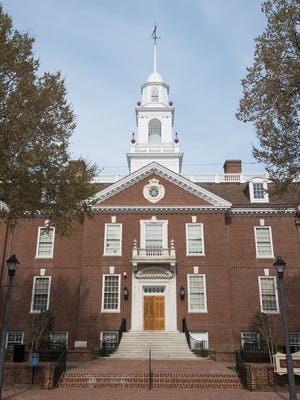Delaware lawmakers: Changes to state Board of Education

A panel of legislators decided Tuesday not to shut down the state Board of Education, but its members made it clear the board needs to make substantial changes.
The Joint Legislative Oversight and Sunset Committee urged the board to be more transparent and responsive to the public.
"I think we can be doing things a little better, to be honest," said Sen. Brian Pettyjohn, R-Georgetown. "I do not think it is prudent at this time to just to get rid of the board. But I think what we should be doing is taking a good hard look at what's going on in education in Delaware, and the board's role is part of that."
EDUCATION NEWS: Should schools teach cursive writing?
The seven-person board, whose members are appointed by the governor, approves school-related regulations and votes on opening and closing most of the state's charter schools. The board is designed to serve as the citizens' voice in education policy, and board members say they play an important role in supporting schools and holding them accountable.
In recent years, however, the board has faced criticism from some education advocates who say it is heavy-handed and detached from the concerns of everyday teachers and parents.
During the fierce 2015 debate over how to improve six Wilmington "Priority Schools," teachers unions voted no-confidence in the state board, arguing it was unfairly punishing schools because of test scores. Some members of the Wilmington Education Improvement Commission criticized the board for being slow to approve their redistricting plan for city schools last year. And some legislators have accused the board of stifling public comment and lobbying on legislation without informing the public where its members stand.
Hoping to rein in the board, those critics have turned to the Sunset Committee, which periodically reviews state agencies to see if they are still necessary and recommends changes to their structure, if necessary.
The committee considered a proposal to "terminate" the board entirely and pass its responsibilities on to the Department of Education, local districts and the Delaware State Education Association teachers' union. While its members ended up not voting on that idea, some did express support for it.
"I am unclear exactly what it is the organization does," said Rep. Jeff Spiegelman, R-Clayton. "I am extremely, extremely disappointed by the lack of transparency by the board when it comes to taking positions on legislation."
Spiegelman questioned how the board can claim to speak for citizens when it was appointed, not elected.
"We don't have the conflict of interest of having to pander to special interest groups or to certain constituents," said board member Gregory Coverdale.
Spiegelman shot back: "I understand that, and there is some truth to that, but I don't want to hear that the state board is the citizens' voice when you're turning around and saying we're not responsible to the citizens."
The committee made several recommendations, most of which will require legislation or changes to board policy to take effect.
Many of them focused on making the board's meetings and deliberations more open to the public. The committee recommended rotating board meeting locations among all three counties, instead of holding every meeting in Dover. They also recommended the board meet at 5 p.m. instead of during the workday and urged the board to try and limit the length of their meetings, which usually last several hours.
The committee also pressed the board to be more willing to take public comment. Board members said they were open to doing that, but said some of the things they vote on — like charter approvals and regulations — require designated public comment periods that end before the day they vote.
Educators and advocates have complained that the board's current setup makes it hard for working people to attend their meetings — and difficult to voice their opinions if they do manage to attend.
The committee recommended that the board be required to vote publicly on whether it would support or oppose legislation. And it required the board to write a new job description for its executive director, a non-voting staffer who does much of the board's behind-the-scenes work.
Some lawmakers are upset with the current executive director, Donna Johnson, for pushing or fighting against bills in Legislative Hall that the board has not formally voted on.
The legislators ran out of time during the two-hour hearing before they addressed every proposed recommendation.
That includes a potentially controversial recommendation that would require the board to "provide evidence of a sustainable path for charter schools to include local buy-in to avoid disruption of the local portfolio" "when granting new charters. Some traditional school advocates argue the board should consider the impact on local districts when approving charters, but some charter school backers say the state should approve any new charter that shows it can provide good results for kids.
Contact Matthew Albright at malbright@delawareonline.com, (302) 324-2428 or on Twitter @TNJ_malbright.